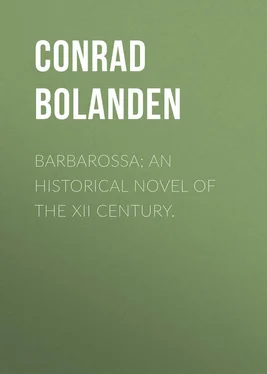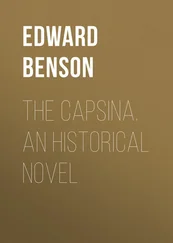Conrad Bolanden - Barbarossa; An Historical Novel of the XII Century.
Здесь есть возможность читать онлайн «Conrad Bolanden - Barbarossa; An Historical Novel of the XII Century.» — ознакомительный отрывок электронной книги совершенно бесплатно, а после прочтения отрывка купить полную версию. В некоторых случаях можно слушать аудио, скачать через торрент в формате fb2 и присутствует краткое содержание. Жанр: foreign_antique, foreign_prose, Историческая проза, на английском языке. Описание произведения, (предисловие) а так же отзывы посетителей доступны на портале библиотеки ЛибКат.
- Название:Barbarossa; An Historical Novel of the XII Century.
- Автор:
- Жанр:
- Год:неизвестен
- ISBN:нет данных
- Рейтинг книги:5 / 5. Голосов: 1
-
Избранное:Добавить в избранное
- Отзывы:
-
Ваша оценка:
- 100
- 1
- 2
- 3
- 4
- 5
Barbarossa; An Historical Novel of the XII Century.: краткое содержание, описание и аннотация
Предлагаем к чтению аннотацию, описание, краткое содержание или предисловие (зависит от того, что написал сам автор книги «Barbarossa; An Historical Novel of the XII Century.»). Если вы не нашли необходимую информацию о книге — напишите в комментариях, мы постараемся отыскать её.
Barbarossa; An Historical Novel of the XII Century. — читать онлайн ознакомительный отрывок
Ниже представлен текст книги, разбитый по страницам. Система сохранения места последней прочитанной страницы, позволяет с удобством читать онлайн бесплатно книгу «Barbarossa; An Historical Novel of the XII Century.», без необходимости каждый раз заново искать на чём Вы остановились. Поставьте закладку, и сможете в любой момент перейти на страницу, на которой закончили чтение.
Интервал:
Закладка:
Whilst the Bolognese legists insisted upon privileges being accorded to the Emperor, based upon the old Roman law, the Lombard counsellors complained of an autocratic despotism, in the decisions, subversive of their own peculiar rights, and inimical to the interests of their country. For example, all revenues from tolls on rivers and bridges, and tonnage dues in ports and harbors, were to revert hereafter to the Emperor; and all duties on grain, salt works, and fisheries, with the right of coinage, hitherto a prerogative of the dukes, counts, and free cities, were in future to belong exclusively to the Imperial treasury.
Barbarossa had destroyed the autonomy of the Lombard cities, and reduced them to be mere dependencies of the empire. Still, so long as he remained in Upper Italy, no open signs of discontent were manifested, but scarcely had he turned towards Rome, when the revolt broke out. In order to pacify, if possible, the malcontents, Otto de Wittelsbach; the Chancellor Rinaldo, and the Knight of Goswin were at once sent to Milan. But the exasperated populace assembled before the dwelling of the ambassadors, who with much difficulty escaped being torn to pieces.
This unexpected outrage excited the rage of the German nobles who accompanied the Emperor, and the rebellious city was threatened with sack and pillage, while its inhabitants were doomed to slavery. This fierce menace, however, by no means disheartened the Milanese, who determined to employ every means of resistance in their power, and to die gloriously rather than wear the fetters of serfdom. The struggle began at once, and while Barbarossa was celebrating the festival of Easter at Bologna, the Lombards seized the Imperial treasury, in which were lodged the enormous sums which he had collected in Italy. Then they burned the castle and hung all the garrison, who were Italians, as traitors to their country.
The Emperor hastened back with his little army, but he arrived too late; the Milanese had retreated behind their works, and from the walls of the city could see Frederic, in his anger, lay waste all the surrounding country; for, weak in numbers and destitute of siege artillery, his army was powerless against the town. Scarcely had he left the neighborhood, when the Lombards took up again the offensive, and retaliated upon the Emperor's allies for the havoc which he had caused in their territory. Joining their forces to those of the Brescians, they took Lodi and Cremona, and made several attacks upon the Imperialist forces; and such was the vindictiveness displayed; that several abortive attempts were made to assassinate the German Emperor, who was unable to check or punish these acts of hostility. His army was composed almost entirely of Italians, and although the rebellious city of Cremona was taken and burned, his reprisals were without result.
This continual strife and its attendant misfortunes, equally disastrous for both factions, reduced Lombardy almost to a desert. The devastated fields produced no more crops, and the ground being unable to sustain even the native population, the foreign troops suffered severely from famine. Barbarossa convoked again his knights and nobles, thanked and rewarded them publicly for their devotion to his cause, and disbanded the Germans, promising to open the campaign with a strong army, early in the following spring.
CHAPTER II.
THE AMBUSCADE
After a winter spent in harassing the enemy and in petty skirmishes with the Emperor's adherents, the Milanese inaugurated the year 1161, in a more serious manner, by the capture of several fortresses, some by assault, others through treachery. Frederic was still unable to make any serious resistance to his enemy's advance; for the German reinforcements had not yet arrived, and his own little army, in order to hasten the fall of Milan, was besieging the towns of Como and Neulodi, so that his operations were limited almost to a strictly defensive policy, whilst, in person, he rode at the head of a small escort, through the province, reassuring his declared allies and conciliating those whose sentiments were as yet doubtful.
It was a beautiful morning. A small troop of armed men, whose appearance was that of banditti, were keeping guard at the foot of a hill, about two days' journey from Milan. The soldiers, wearied by a long march, were stretched upon the ground, and about a dozen horses, with heaving flanks, stood close by, showing clearly that they had shared the fatigue of their riders.
The chief of the band stood a little to their rear, and with his arms crossed on his breast, appeared to be reflecting profoundly. His costly armor and proud bearing was not that of a robber, for his shield was magnificently embossed in silver, the border of his surcoat richly embroidered, and his sword-belt inlaid with precious jewels. By his side stood a man of short stature, apparently quite at his ease. He wore a pointed hat, and on his bronzed face beamed an expression of knavery and deceit, which, with his sparkling eye and a continued sneer around the mouth, gave to his whole physiognomy a most malevolent character. He carried a cross-bow and a quiver full of bolts on his back, and by his side hung a long rapier.
"Nothing!" said the knight, angrily. "Ah! Griffi, if you have deceived me, you shall be flogged."
"Flogged! my lord Pietro! I, Cocco Griffi, the son of the high and mighty Consul Nigri of Milan! I flogged!" said the little man, with marked astonishment.
"Yes, without fail!"
"How, my lord Pietro! your native city boasts of giving liberty to the Italians. Would it not be barbarous to flog a loyal citizen?"
"You have most richly deserved it! At this very moment, the Milanese are destroying one of the strongholds of German tyranny; and I, who would so gladly have shared in the glorious work, have been decoyed here by your specious tale, to await, uselessly, the coming of that accursed Barbarossa, while my countrymen are celebrating their triumph."
"I crave your pardon, my lord! The destruction of a castle, already half in ruins is scarcely a deed worthy of your heroism," replied Griffi, in a half serious, half jocular tone. "Ah! it would be another thing had it been necessary to storm the Castle of Cinola. But as Barbarossa's worthy governor, Bonello, has in a fit of patriotism opened the gates, I could see but little opportunity there for a display of your valor. For the prowess of the brave Milanese will not go further than the draining of some wine-casks and the destruction of some old furniture; they may perhaps burn the castle, but, this done, they will return within their city walls."
Pietro made no reply, but with a glance of contempt upon the speaker, again turned to gaze into the distance.
"On the other hand," continued Griffi, proudly, "you will have, thanks to me, a chance of doing here something truly heroic. I learned that the Emperor, with a feeble escort, was about to proceed towards the North; I managed to insinuate myself among the soldiers, and discovered the road by which he was to travel; and then galloping night and day, came here, to show you how to rid the country of its oppressor, by his death or capture! And yet, as a reward for all this, you threaten to flog me!"
"But if we succeed!" said Pietro, his face flushing with enthusiasm, "if we succeed, I will fill your hat with gold pieces. I will have your name engraved upon tablets of bronze, and your statue erected in every public square in Lombardy."
Cocco scarcely heeded the last words, so intently did he gaze towards the distant horizon. Suddenly he seized the arm of the knight:
"Look there!" he cried, "there, near the forest; see that armor shining in the sun. It is Barbarossa himself, followed by eighteen knights and seventy varlets!"
"Oh! the wretch!" exclaimed the Milanese, with an expression of mingled hatred and anger.
Читать дальшеИнтервал:
Закладка:
Похожие книги на «Barbarossa; An Historical Novel of the XII Century.»
Представляем Вашему вниманию похожие книги на «Barbarossa; An Historical Novel of the XII Century.» списком для выбора. Мы отобрали схожую по названию и смыслу литературу в надежде предоставить читателям больше вариантов отыскать новые, интересные, ещё непрочитанные произведения.
Обсуждение, отзывы о книге «Barbarossa; An Historical Novel of the XII Century.» и просто собственные мнения читателей. Оставьте ваши комментарии, напишите, что Вы думаете о произведении, его смысле или главных героях. Укажите что конкретно понравилось, а что нет, и почему Вы так считаете.












